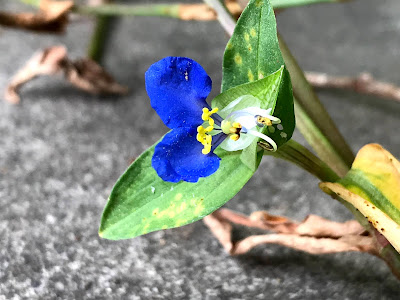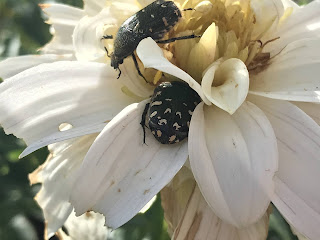The last two years I've used some interesting and challenging questions to write this last post of the year, so I'm going to do it again.David and me enjoying a pre-Christmas
date.
1. What makes this year unforgettable?
- Second year of the pandemic, what can I say...
- Personally we've had tragedy, ill-health, injury, despair, close encounters with suicide, exhaustion, a creative ending to a high school career, lack of clarity about the future, etc. Some, but not much of that was related to the pandemic. Altogether it's made for a very challenging year personally. I'm thankful for a fulfilling job that meant that even when I had no answers for the personal pain we faced, I found joy and purpose in my work, and of course God gave me hope.
2. What did I enjoy doing this year?
- Editing fiction in my spare time. I spent a couple of months early in the year editing a book by a friend of mine. First time to edit a book-length manuscript, first time to edit fiction. It was challenging in a good way and I hope I get another opportunity to do it again in the future (though it would be great if I could devote work-time, rather than spare-tie to such a project).
- Baking and reading: my two passions I've continued to love.
- Camping: we only made it out to two camping trips this year and one of those was shortened due to a typhoon. The pandemic made it difficult to book campsites across prefectural borders and we complicated things by trying to gather a larger group to do it.
- Walking after dinner: this has become one of my favourite things too, most of the time I love catching up with my husband during our 4–5 km walk, and I miss it when weather or work or other events mean we can't do it for a few days.
- Weekly video calls with our eldest son have been really great too. Often one or both of his brothers join and we usually end up playing online board/card games.
3. What/who is one thing/person you're grateful for?
- I'm grateful for a solid marriage, for a husband who is calm and committed to his family, and we've walked through a very hard year shoulder-to-shoulder. Many people don't have that. I'm ever so grateful I do.
- I'm also grateful to my friends. My daily-trio of friends as well as some other women who have emerged as even more precious than they were before.
4. What did you read/watch/listen to that made the most impact this year?
- Mmm. Hard question as usual. Looking at the books I've read (post on Dec 13), I would suggest the Bogel book about overthinking was probably the most impactful. I also have enjoyed listening sporadically to a podcast call Undeceptions, for example the episode about a same-sex-attracted Christian was eye opening and ultimately very encouraging, another episode I posted about here on Friendship was also excellent.
5. What did you worry about most and how did it turn out?
- This is something I can't share here due to protecting the privacy of my family. My worst fear didn't eventuate, but it still might, only God knows.
6. What's my biggest regret?
- Not being able to see my eldest son this year (it's been 2 ½ yrs now).
- I regret not being able to see any Olympics or Paralympics in person, despite living in the city where they were held.
- Not having the emotional energy to do some things that I used to do.
7. What's something that has changed about me?
- I think I've become a little less less zoned in on "what's next" for our boys. I've had a lot of my expectations for them stripped away (expectations I mostly didn't realise I held).
- I did more teaching this year than I've ever done (mostly in the first quarter of the year). I still don't think it's really my wheelhouse, but it was good to have the opportunity to help other adults learn new things.
- I've become even more discerning about who I bare my heart to.
8. What surprised you most this year?
- How many people are rejecting immunisation. Also I've been saddened by Australia's isolationist policy during this pandemic. There are times that it felt like us expats weren't welcome in our home country. And no, I don't wish to have a discussion about this here or on social media. I have steered clear of writing about these things on social media.
- I've also been happily surprised by some of the ways that I've seen my boys grow and change this year. As I wrote in this blog post, it's harder to anticipate when and what milestones older teens and young adults will achieve, but it's just as satisfying (or more) as when they were learning to walk and talk.
- I was also surprised at how difficult it was to get used to being back in-person after many months of online meeting.
- "Be still and know that I am God" (Ps 46: 10) has been an ongoing theme since mid-2018. But I also spent several hours on an "accidental" retreat considering the whole of Psalm 46.
- Also I've returned again and again to Hebrews 12:1-3 and Isaiah 40. Both are worth looking up and pondering deeply.
- Efficiency isn't necessarily God's way or the best way.
- Letting go of control.
- Walking alongside older teens and young adults as a parent (of course all these first three are related!)
- Lily pads (see here)
- I got to ponder a wide variety topics courtesy of my work for example: pop culture in Japan, technology in ministry, history of the Japanese church, men in the church, the best uses of social media for mobilisation, rest, good editing practices, and macrons and other questions of the romanisation of Japanese (look it up, it'll either fascinate you or bore you).
Highlights:
- Two camping trips, including camping in a new prefecture.
- Several opportunities to spend time with family friends in-person for the day or evening.
- Immunisation against COVID-19 (yes, a highlight)
- Seeing the social media team that I lead continue to forge ahead producing excellent content.
- Editing a fiction book (as mentioned above)
- The new building and sports field at school. I've rarely been there and actually haven't set foot on the oval ("field" for Americans), but it's great to hear about how it's being used.
Lowlights:
- Aforementioned tragedy and ill-health
- Missed opportunities for good fellowship during online meetings, sometimes due to a lack of thinking-outside-the box by event organisers.
- Shortened winter holiday due to an unexpected and dramatic medical event
- Seeing my boys struggle
- Too many online meetings and not enough people-time some weeks.
- Church being online for most of the year.
- Not being able to get to Australia (which meant some thinking outside the box for a few items I'd rather buy in person there).
Goals: these were my stated goals for 2021 (in my first blog post this year) and I think I've done okay at these. How we worked towards #1 looked surprising at times to some outside our household, but there were good reasons for what we did. Of course these aren't "SMART" goals, in that they aren't Measurable, but then I think that there is much that needs to be achieved in life that can't be measured easily and isn't short-term.
- Looking after myself and my household as best I can
- Taking care to look out for others who are within my circle of influence—keeping my eyes open for opportunities to serve them and others further afield, and
- Working to the best of my ability in all the tasks that are mine to do.





















